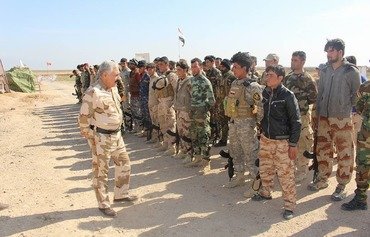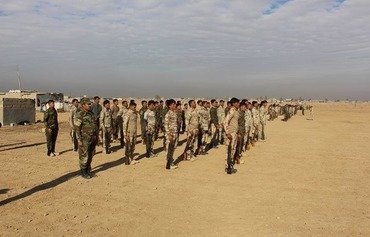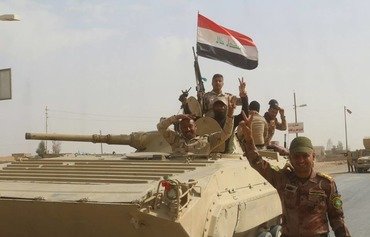With victory drawing nigh in Mosul, Iraqi forces are looking towards the Kirkuk province town of al-Hawija, which has become a sanctuary for fleeing "Islamic State of Iraq and Syria" (ISIS) fighters.
As it faces defeat elsewhere in the country, ISIS has been attempting to gain a larger foothold in al-Hawija, said Hawija tribal leader Sheikh Wasfi al-Assi.
"The group has started digging trenches and secret tunnels," he told Diyaruna, and has driven the population in surrounding villages out of their homes in order to transform the land around al-Hawija into a fortified buffer zone.
ISIS fighters have been planting mines and improvised explosive devices (IEDs) and have been stockpiling food supplies in anticipation of a future military offensive to liberate the area, al-Assi said.
Meanwhile, he added, residents trapped inside the town report that the group has been forcibly recruiting young men and opening training camps.
Residents have been prevented from leaving, he said, and fear that the group plans to use them as human shields.
"ISIS’s abuses against unarmed people have increased in brutality," al-Assi said. "We hear from residents who have escaped that whole families have been executed after failing to flee the group's grip."
Inside the town, there has been a shortage in food and medical supplies. According to media reports, the group has appropriated most of the remaining supplies and has been selling residents expired medications.
ISIS leaders amass in al-Hawija
"Many group leaders and fighters have fled from liberated cities and managed to reach al-Hawija, taking advantage of its vast desert area and many canyons," al-Assi said.
At present, there are between 2,000 and 4,000 ISIS fighters in the area, which has become a "major haven" for the group's leadership, Deputy Mayor of Kirkuk Rakan al-Jubury told Diyaruna.
The group hopes to exploit the rugged terrain which stretches south from al-Qayyarah in Ninawa province to the Hamrin mountains and east to Tuz Khurmatu.
"This is a vast area open to several provinces that includes many villages and areas that are interconnected," al-Jubury said, adding that it seems the group wants to use it as a launchpad for attacks.
"That is what is constantly happening, with occasional militant attacks along the security forces’ defence lines," he said, which mainly pose a threat to the Ajil and Allas oil fields and the cities of Kirkuk, al-Shirqat and Tikrit.
"The military leadership knows well the danger posed by the terrorists’ presence in al-Hawija, and considers its liberation a priority after Mosul’s retaking," al-Jubury said.
Town residents suffer under ISIS
ISIS has been imprisoning, torturing and even killing al-Hawija residents under various pretexts, without a shred of mercy, al-Jubury said.
Many residents have been "risking their lives in order to break free of this oppression, and their suffering should not go on for much longer", he said.
The operation to liberate al-Hawija will require a high level of co-ordination between the various security forces, security expert and former Interior Ministry official Jassim Hanoun told Diyaruna.
He called for the establishment of a special co-ordination room that includes joint forces from the Salaheddine, Samarra and al-Rafidain operations commands, as well as Peshmerga forces and Kirkuk police.
The offensive will require careful planning, he said, as al-Hawija is home to thousands of trapped civilians and ISIS has a record of brutality.
On the first day of Eid al-Fitr (June 25th), Hanoun said, the group slaughtered seven men it had accused of collaborating with Iraqi forces.
"This constitutes the latest chapter in ISIS’s series of crimes against the people of al-Hawija," he said.

![Iraqi fighters from al-Hawija in Kirkuk province prepare to take on the 'Islamic State of Iraq and Syria' in their town. [Photo courtesy of Sheikh Assi al-Wasfi]](/cnmi_di/images/2017/07/05/8572-Iraq-Hawija-ISIS-600_384.jpg)






